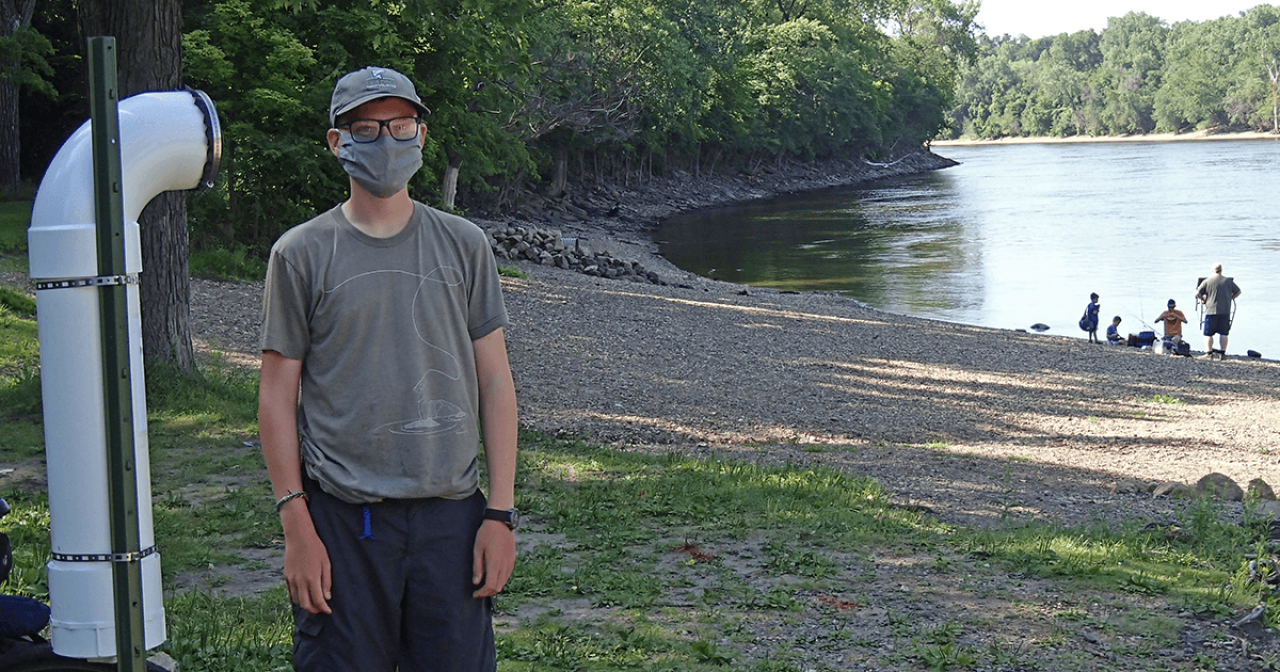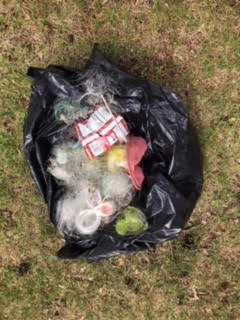Environmental Stewardship Institute alum keeps Hidden Falls Park clean

As we prepare for our third year of the Environmental Stewardship Institute (ESI) this summer, we were thrilled to hear from Jonathan Wilson-Thieroff, an ESI fellow in the summer of 2020. Jonathan is an avid angler. He often casts a line at Hidden Falls Park in St. Paul, as do many others, because it's a peaceful place to enjoy the river in the metro area.
But last year, Jonathan noticed that fishing line and other waste often gets left behind, and there's no easy way to dispose of it. As Jonathan wrote in a previous article about the project, "Every year, thousands of animals are killed by discarded fishing line. When improperly disposed of, fishing line entangles anything that it can wrap around. Even fishing line put in the trash can be hazardous when birds pick it out as nesting material and entangle themselves or redistribute it into the environment."
For his final project in our summer program, Jonathan built and installed a PVC fishing line receptacle at Hidden Falls Park. He got the idea for the receptacle while visiting his grandparents in Florida. He hadn't seen one like that in Minnesota yet but thought it was a great way to keep this dangerous litter out of the river.
We recently caught up with Jonathan about his ongoing commitment to this project and about his future plans.
How often do you check and clean out the receptacle?
I have been checking on the receptacle once a month, but will probably go more often as angling pressure increases during the spring and summer.
Since I started monitoring the receptacle, I have kept all of the fishing line and micro trash in a large garbage bag.

Have you had any interactions with other anglers or park-goers during this process? What have been their thoughts and reactions?
I have had a few interactions with anglers and other park users wondering what the receptacle was, and everyone that I talked to was excited to know that the problem of discarded fishing line was being addressed.
Have you thought about expanding the project?
With support from park maintenance to help check on receptacles, I would love to install more of these at other popular fishing locations. Having multiple receptacles would help educate more people on the impacts of fishing line on the environment, and encourage proper disposal of fishing line.
Do you have any fishing triumphs or memorable moments from the last year?
One of the more memorable moments from the last year was going fishing at Boom Island (in Minneapolis) last spring. School was online, and when I was done, I would ride my bike down to the river to fly fish for smallmouth bass. Being able to go fishing during an uncertain time helped me relax and destress.
What are your plans for the next year?
Next year I will be attending the University of Minnesota Twin Cities, and majoring in fisheries, wildlife and conservation biology.
Do you plan to continue to monitor the fishing line receptacle?
I will continue monitoring the receptacle throughout the summer and will be in communication about maintaining the receptacle once I go to college.
Download the flyer of tips for anglers that Jonathan made and handed out when he installed the receptacle last summer.
Since last summer, we've heard from our partners that fishing line receptacles like this are becoming more and more common. Our friends from the Hastings Environmental Protectors have installed similar receptacles at five locations, including Lake Rebecca, Lake Isabelle and the Mississippi River.
* * * * *
What's the Environmental Stewardship Institute?
FMR created the Environmental Stewardship Institute to address the gap between environmental education and a career path in the environmental field.
While many high schools offer green teams or eco clubs, young people often don't have many chances to explore what a real career in the environmental field would look like. As an environmental organization, we wanted to use our resources to help address that gap, in turn growing a stronger, more equitable movement.
We provide paid job experience and foundational learning to a group of students curious about environmental career paths. Our hope is that, by completing the program, participants are more prepared for continued schooling in environmental subjects and have real work experience to lean on for future job opportunities in the field.